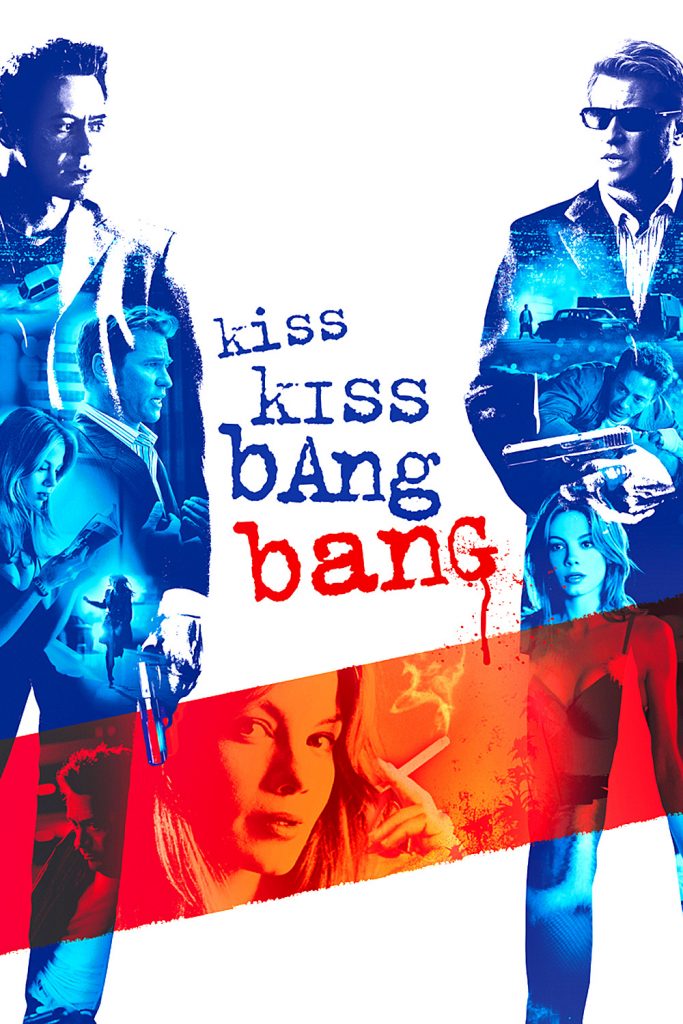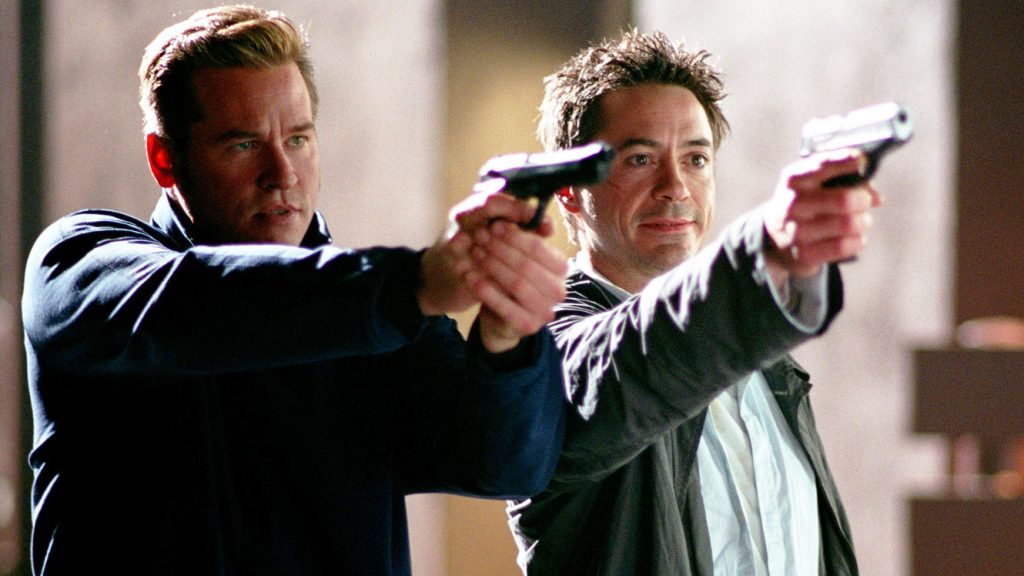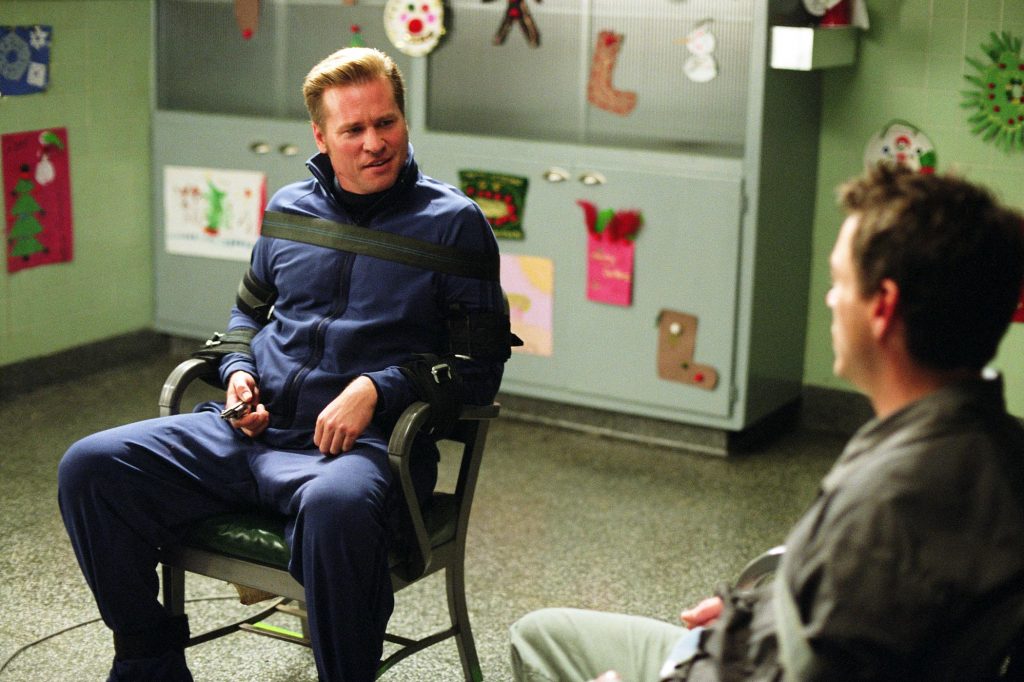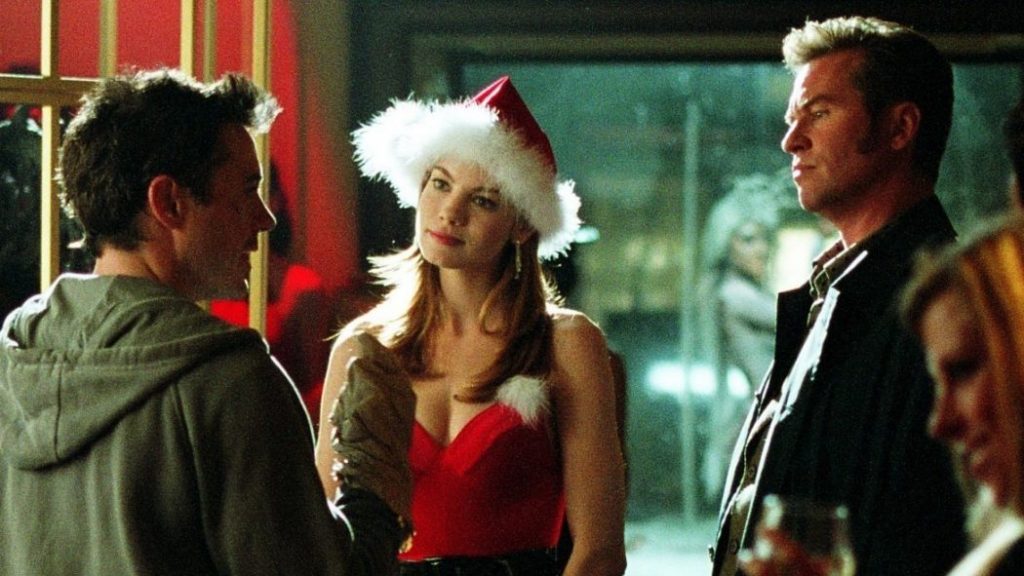Each week in November, the Deadshirt crew is partnering up for a look at cinema’s defining Buddy Cop movies. This week: David Uzumeri and Kayleigh Hearn face off against the noir-infused Kiss Kiss Bang Bang.
David: While I really enjoyed this summer’s The Nice Guys and I think Iron Man 3 is actually a very underrated and subversive superhero movie—and I’m obviously a big fan of his screenwriting—I’d never seen Shane Black’s directorial debut until now, and it’s an absolute blast. It’s very cocky and self-assured for a comeback effort (not just for Black but also for much of the cast), and while it definitely fits neatly into Black’s oeuvre—it’s a buddy cop movie set at Christmas, for God’s sake—it’s also astonishingly self-aware, like it kept playing chicken with clichés and turning away just at the last second. Kayleigh, what did you think? This wasn’t your first viewing, right?
Kayleigh: Yeah! It’s been a few years since my first viewing, so this viewing of Kiss Kiss Bang Bang was like a rediscovery. Like, I can’t believe I forgot this was a pre-Iron Man Robert Downey Jr. movie with a big drunk guy stumbling around in a robot suit! Still, it feels just a little weird to call this a “buddy cop” movie, since technically neither of our stars are cops—Val Kilmer’s Perry van Shrike is a private investigator, and Downey’s Harry Lockhart is a criminal playing an actor playing a private investigator. (Just imagine all that in RDJ’s voice, as he is the perfect receptacle for Shane Black’s rapid fire dialogue.) I love that this film is an ode to the L.A. noir of Raymond Chandler and Brett Halliday that still feels totally modern and new.
David: Yeah, and in a really self-aware way, too. It’s a story about people who’ve fallen in love with the L.A. of pulp noir trying to deal with the complexities of L.A. as a real place and being mocked for their romanticism, only to have that romanticism justified as the “real world” ends up being just as ridiculous, byzantine and symbolic as the pulp noir they (well, especially Harmony) feel they were supposed to grow out of. It’s a story of Hollywood then set in Hollywood today, to butcher and paraphrase Lin-Manuel Miranda. Out of all the Shane Black stuff I’ve seen, this feels the most ur-Shane Black, the perfect combination of his earnest humanism and irreverent cynicism.
And every actor in it is incredible.
Kayleigh: While RDJ undoubtedly has the flashiest role, for me this is Val Kilmer’s film. The flustered, “I’m too old for this shit” professional thrown into a seedy world of vice and murder is a stock Shane Black character (see also: Danny Glover in Lethal Weapon and Russell Crowe in The Nice Guys), but Kilmer is so wonderful as Perry that he never feels like he came off the Hollywood Action Script assembly line. Partly this is because you can’t exactly call Perry the “straight” man of the story—he’s one of the few openly gay heroes in action cinema. Perry’s sexuality is one of the big modern twists to the noir genre, and aside from being derisively called “Gay Perry” at the beginning of the film, his story arc isn’t exploitative or stereotypical. One of my favorite moments in Kiss Kiss Bang Bang is when Perry shoots a perp with a gun hidden in his crotch, because “homophobes never check there.” What did you think?
David: Man, I thought everything about Perry was fantastic, and the fact that I thought that was incredibly surprising. I mean, Shane Black is a straight dude who wrote macho action movies in the ‘80s, so a funny, self-aware, heroic but unapologetically, loudly gay badass was not something I thought was within his range. And yet, Perry gets most of the movie’s best lines, and Val sells them simply by being himself. The one thing I could say about Perry’s sexuality is that it’s still passive. It’s all talk, because the movie (or maybe Black’s writing) felt like it wasn’t ready to commit to him actually expressing that sexuality.
Kayleigh: There has to be some good Perry/Harry (“Parry”?) fanfic out there to scratch that itch, their dynamic is too good!
David: Still, in the world of gay noir private eyes, he’s a singular object, and I’m maybe being unfair judging this 2005 movie’s portrayals through 2016 eyes. And man, Val Kilmer was an absolute blast to watch.
Kayleigh: This is really a movie about characters, which is good because, in true Chandler fashion, the twisting plot is so labyrinthine that trying to quickly summarize it makes little cartoon question marks pop up over my head. Basically: Hollywood outsiders Harry and Perry are framed for a murder of an heiress, with many plot points (“The Lady in the Lake,” “The Little Sister”) curbed from Raymond Chandler novel titles. Unfortunately—and this is another page from the Shane Black playbook—the movie is built on the dead bodies of several women. That’s why it’s so important that our female lead, failed starlet Harmony (Michelle Monaghan) is such a well-developed character, much more than a generic femme fatale paper doll.
David: As far as I can tell, this is Monaghan’s breakout role. I’d previously only seen her in the first season of True Detective, where she got a hell of a lot less to do. To be honest, from the cold open (where she declares her ambition to be an actress in the middle of a minor social calamity of her making) on, I’d been expecting a Dirty Rotten Scoundrels-style ending where she would be revealed as the true author of our protagonists’ despair the entire time. I was relieved to see that not be the case. As a matter of fact, her story is the movie’s emotional core: Perry and Harry are ultimately largely defined by their relationships with her, while she bears the weight of her close relationship with her abused sister that provides the spark for the kindling of anger that drives much of the movie’s violence. It’s her story, and the Hollywood bigshots are just along for the ride.
Kayleigh: I loved Monaghan; I myself was once a little girl reading those grubby, green-edged pulp paperbacks, so I related to her a lot. Even with all the wild twists in this movie, the only thing that threw me was the characters pretending Monaghan and Downey were childhood friends, like he clearly doesn’t have a decade on her. (I can imagine Harry saying, “That’s Hollywood for ya!” in a sardonic voiceover.) So David, I think it’s safe to say you’re a Shane Black fan. Where does this rank for you? What do you think of Robert Downey Jr, since this was one of his last great roles before going full Tony Stark?
David: I’m not actually a huge Shane Black fan in terms of, like, going back in my life; my first Black movie was actually, uh, I think it was Iron Man 3. I’ve still never seen The Last Boy Scout, and while I enjoyed the hell out of The Nice Guys, I’m coming to Black’s oeuvre relatively late. Thankfully, his filmography is relatively small, especially for a guy who’s been actively working for over two decades, and it’s easy to digest quickly. I think this is definitely his best directorial effort; the attempts at subverting misogynistic cliches work better here than in Nice Guys, and while the Mandarin twist in Iron Man 3 is in my opinion a work of sublime genius, it’s still an Ike Perlmutter-era Marvel movie with a bland-ass score where any sense of personal style is peeking through a shroud. This, though, is fully formed and brilliant, and it’s easy to see how this was the primer for the rocket that shot Downey back into superstardom. He’s witty, he’s likeable, he’s flawed and fucks up royally without completely losing the audience’s sympathy; he’s a great shaggy-dog hard-luck protagonist. Downey plays him like a guy who knows he’s in a comedy, but thinks he could have killed the case if it were a straightforward drama anyway.
Kayleigh: This year kind of became an unofficial Shane Black retrospective for me–I saw The Nice Guys and The Long Kiss Goodnight for the first time, then revisited the first two Lethal Weapon films before now returning to Kiss Kiss Bang Bang. I think KKBB has some of the strongest characters and performances of Black’s oeuvre, though the plot is maybe more memorable for the classic noir it satirizes than its new twists. With its stellar cast, Kiss Kiss Bang Bang gives the buddy cop genre a fresh shot in the arm.
David: Yeah, I’m really glad this was the entry I did. It’s a movie I’d been meaning to get around to for a while, and finally watching it didn’t disappoint: it’s fun, it’s funny, it’s self-aware and it’s able to combine mean humor with heartfelt sincerity into a surprisingly cohesive package, especially for a directorial debut. It launched and relaunched a few careers, and while it definitely falls into the trap of becoming what it’s satirizing (as you pointed out, Downey has like a decade on Monaghan), it’s a hell of a mission statement for a career and if it feels derivative of Black’s other work, that’s only because I saw it last and he did it first.
Thanks for reading BUDDY COPS! If you haven’t already, enjoy our previous installments: 48 Hrs., Dead Heat, Rush Hour, and The Last Boy Scout!






